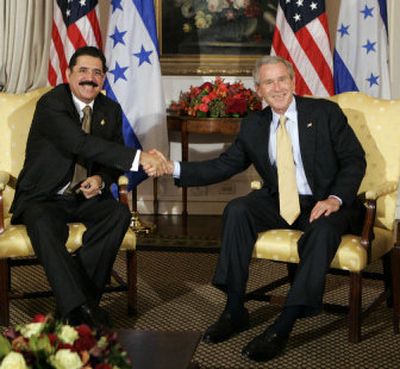Amid crises, Bush to address U.N.

UNITED NATIONS – President Bush addresses world leaders at the United Nations today as his administration grapples with crises around the globe and seems to have fewer options for dealing with them.
The nuclear standoffs with Iran and North Korea, the Israeli-Palestinian conflict and attacks in Sudan’s Darfur region will top the president’s agenda when he speaks to the U.N. General Assembly and privately to foreign leaders.
Bush has expressed frustration over the lack of progress in his key foreign policy initiatives and at times has criticized the United Nations for its deliberative pace and propensity for passing resolutions instead of taking concrete action.
U.N. Secretary-General Kofi Annan and world leaders, in turn, have criticized the White House for the go-it-alone approach it took in Bush’s first term.
“Bush is frustrated with the U.N. because the U.N. won’t pick up and respond in an immediate way,” said Stephen Schlesinger, director of the World Policy Institute at the New School in New York. “Iran remains a big problem for the administration, North Korea is a question mark, and Darfur is in the balance – three issues on the plate of the U.N. with no clear resolution.”
At the U.N., Bush intends to highlight his vision of spreading democracy in the Middle East as a way to combat terrorism.
“He will talk about, and I think really challenge, all of the other countries assembled there, and the United Nations as an institution, to take some responsibility in its role – and step up to the role of encouraging … the forces of moderation in this struggle against extremism,” National Security Adviser Stephen Hadley told reporters Monday.
On Iran, administration officials have put on hold the U.S. drive for sanctions against Tehran if it doesn’t suspend uranium enrichment. Although they fear the Iranians are merely playing for more time to develop nuclear weapons, administration officials have little choice but to allow Europe’s diplomacy with Iran to play itself out; their push for sanctions has run into resistance from allies.
The administration officials, who spoke on the condition of anonymity because of the sensitivity of the talks, said they wouldn’t be able to get European, Russian and Chinese support for sanctions until diplomatic efforts are exhausted. France, Russia and China are veto-holding members of the U.N. Security Council.
French President Jacques Chirac said Monday that Iran’s suspension of uranium enrichment shouldn’t be a precondition for negotiations. The Bush administration insists that it must be. Chirac also called for the threat of sanctions to be set aside, apparently backing away from a strategy that the European countries, Russia and the United States agreed to in June. Chirac and Bush are to meet today.
European Union negotiator Javier Solana will meet here later this week with Iran’s senior nuclear negotiator, Ali Larijani. The EU, with U.S. backing, is trying to get Iran to suspend uranium enrichment temporarily, which would open the door to negotiations that the United States would join for the first time.